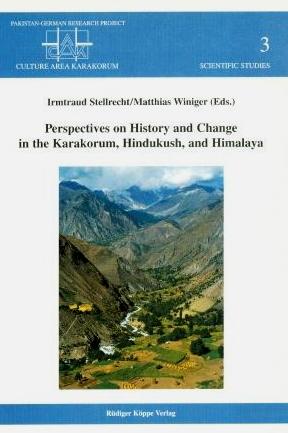
Perspectives on History and Change in the Karakorum, Hindukush, and Himalaya
Edited by: Irmtraud Stellrecht, Matthias Winiger. With contributions by: Muhammad Azam Chaudhary, Jürgen Clemens, Thomas Cramer, Andreas Dittmann, Christoph Dittrich, Thierry Dodin, Jürgen W. Frembgen, Rainer Graafen, Roland Hansen, Hiltrud Herbers, Thomas Hoffmann, Monika Krengel, Sabine Lentz, Antje Linkenbach, Johannes H. Löhr, Ulrike Müller-Böker, Marcus Nüsser, Joanna Pfaff-Czarnecka, Benno Pilardeaux, Andreas Rieck, Udo Schickhoff, Dietrich Schmidt-Vogt, Klaus Seeland, Irmtraud Stellrecht, Martin Sökefeld, Susanne von der Heide, Claus Peter Zoller. Series edited by: Irmtraud Stellrecht.
Series: CAK Culture Area Karakorum Volume 3
199712 pp. Roman, 509 pp.
11 b/w photos, 18 maps, 8 folding maps, 18 graphs, 5 drawings
Text language(s): English
Format: 170 x 240 mm
1030 g
Paperback
€ 69.80
Buy 'Perspectives on History and Change in the Karakorum, Hindukush, and Himalaya' as a downloadable PDF document directly from our online shop »
Order 'Perspectives on History and Change in the Karakorum, Hindukush, and Himalaya' as print edition »
The contributions to this proceedings volume emerged from an interdisciplinary workshop, held in April 1995, which brought together members of two high-mountain research projects supported by the Deutsche Forschungsgemeinschaft (German Research Foundation). Regionally, the focus was on northern Pakistan, India and Nepal. The main topic common to all participants was the dynamic aspect of the relationships between highlands and lowlands in the past and the present, and their impact in the high mountain regions on trade, population structure, ethnic and religious identity-forming processes as well as the use of the environment. In addition, this volume discusses the aspects and implementations of policies aimed at sustainable development in the Himalayan regions of Pakistan, India and Nepal.
CONTENTS
Dynamics of Highland-Lowland Interaction – Past and Present
Irmtraud Stellrecht: Dynamics of Highland-Lowland Interaction in Northern Pakistan since the 19th Century
Christoph Dittrich: Food Security and Vulnerability to Food Crises in the Northern Areas of Pakistan
Benno Pilardeaux: Agrarian Transformation in Northern Pakistan and the Political Economy of Highland-Lowland Interaction
Thomas Hoffmann: Historical Relations between Northeastern Nepal and its Indian and Nepalese Foreland, Exemplified by Migration from the Solu-Khumbu District
Rainer Graafen: Trade and Trading Villages between Tibet and the Lowlands – The Districts of Mustang and Kaski
Christian G. Seeber: The Current State of Research on Historical Development – Processes in the Area of Mustang/Lo. Questions Concerning the Crystallization, Decline and Foundation of States and Settlements
Identity Formation in the Context of Change
Martin Sökefeld: Discourse and Action – Unequivocalness and Ambivalence in Identifications
Andreas Dittmann: Central Goods and Ethno-Linguistic Groups in the Bazaars of Northern Pakistan – An Example of Central Place Theory Modifications in Mountainous Environments
Johannes H. Löhr: History as a Social Practice – An Example from Northern Pakistan
Ulrike Müller-Böker: Tharus and Pahariyas in Chitawan – Observations on the Multi-Ethnic Constellation in Southern Nepal
Monika Krengel: Migration and the Danger of Loss – Some Aspects of Cultural Identity in Kumaon/Indian Himalaya
Thierry Dodin: Transregional Buddhist Organizations in Indian Himalaya
Andreas Rieck: From Mountain Refuge to “Model Area” – Transformation of Shi`i Communities in Northern Pakistan
Environmental Resources – Utilization and Present Exploitation
Jürgen Clemens / Marcus Nüsser: Resource Management in Rupal Valley, Northern Pakistan – The Utilization of Forests and Pastures in the Nanga Parbat Area
Thomas Cramer: Climatic Gradients in the Karakorum and their Effects on the Natural Vegetation
Udo Schickhoff: Ecological Change as a Consequence of Recent Road Building – The Case of the High Altitude Forests of the Karakorum
Dietrich Schmidt-Vogt: Stand Structure as an Indicator of Forest Change Due to Human Impact – A Methodological Contribution with Examples from Nepal and Northern Thailand
Environment under Pressure – Strategies in the Context of Change
Klaus Seeland: Sociological Observations on “Community Forestry” in Nepal
Antje Linkenbach: Social Struggle and Conflict of Interests in the Garhwal Forest
Susanne von der Heide: Cultural Identity and Nature Conservation in Nepal. The Annapurna Conservation-Area Project – An Initiative Worth Imitating
Roland Hansen: Remembering Hazards as “Coping Strategy” – Local Perception of the Disastrous Snowfalls and Rainfalls of September 1992 in Astor Valley, Northwestern Himalaya
Joanna Pfaff-Czarnecka: Complex Communities in Nepal-Himalaya, or: “Solidarity” – A Global Category and a Way of Life
The Transformation of Himalayan “Life Worlds”
Sabine Lentz: British Officers, Kashmiri Officials, Adultery and “Customary Law”
Hiltrud Herbers: The Changing Position of Women in Northern Pakistan – From Agricultural Producers to Off-Farm Employees
Muhammad Azam Chaudhary: Maruts – Gold-Washers of the Indus
Jürgen W. Frembgen: English Loan Words in Burushaski as a Barometer of Cultural Change
Claus Peter Zoller: Heroic Ballads and the Biography of a Woman – On Coping with Conflicts in the Western Garhwal Himalaya
Accompanying material:
- Bibliography – Northern Pakistan
(ISBN 978-3-89645-151-4 ) - Karakorum – Hindukush – Himalaya
(ISBN 978-3-89645-154-5 ) - Mountain Societies in Transition
(ISBN 978-3-89645-156-9 ) - The Past in the Present
(ISBN 978-3-89645-152-1 )
| « back | Print version | [top] |
 Books
Books Audio
Audio Biographies
Biographies Series
Series Festschrifts
Festschrifts Journals
Journals